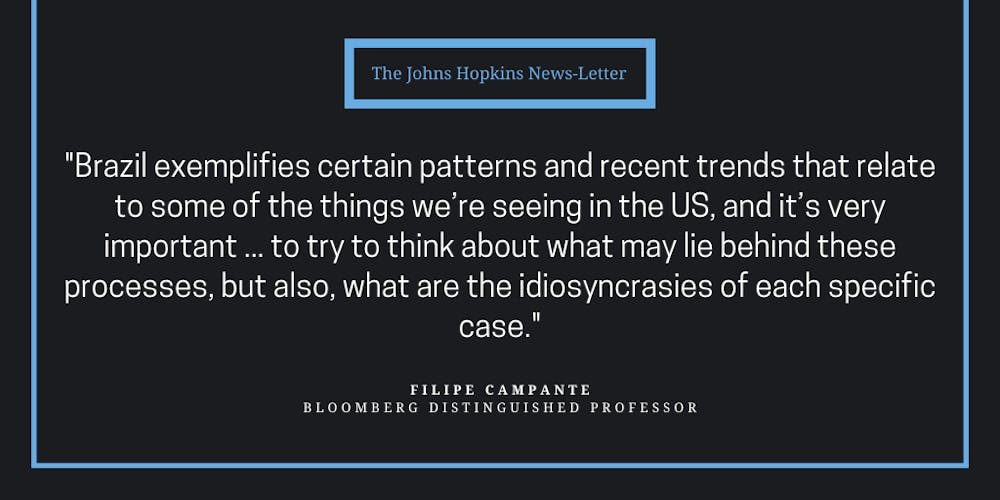The Brazilian Students Organization (BRASA) hosted Dr. Filipe Campante, a Bloomberg distinguished professor at the School of Advanced International Studies (SAIS) and the Carey Business School, on April 26 for a discussion on the political and economic implications of the October 2022 presidential election in Brazil.
In an interview with The News-Letter, President of BRASA junior Victor Aldridge expressed that he hoped that attendees would be able to gain a better understanding of Brazilian politics and economics through the lecture.
“There’s a large Brazilian constituency here at Hopkins but there’s not a lot of visibility,” he said. “Brazil is one of the biggest economies in the world, so [BRASA] wanted to bring some level of knowledge or information [about Brazil] to people in the Hopkins community.”
Sophomore Eric Zixu Wang gave similar reasons for attending the event in an interview with The News-Letter.
“I’m interested in learning about the implications [of the next presidential election] on the international political economy and the future of Brazil as related to globalization,” he said.
Campante opened his lecture by emphasizing why the October 2022 election is an important case study in understanding global trends in politics.
“Brazil exemplifies certain patterns and recent trends that relate to some of the things we’re seeing in the U.S., and it’s very important to recognize some of these common trends and try to think about what may lie behind these processes, but also what the idiosyncrasies of each specific case are,” he said.
In what was described as the closest election in Brazil’s democratic history, Luiz Inácio Lula da Silva, known popularly as Lula, defeated incumbent Jair Bolsonaro with a slim majority of 50.9% of the vote. Campante highlighted how both candidates reflected border trends in polarization. He stated that Bolsonaro's political platform exemplifies recent trends in right-wing populism, while Lula, a member of the Workers' Party, reflects the state of Brazilian left-wing politics.
Lula, who previously served as the 35th president of Brazil, left office in 2010 as the most popular president in Brazilian democratic history. However, in July 2017, he was convicted on charges of money laundering and corruption in a controversial trial. The case was later nullified in April 2021.
On the other hand, Campante described Bolsonaro as the “Brazilian Trump.” After pre-election polls stated that Lula had an advantage, Bolsonaro made multiple accusations of electoral fraud. After losing the election, on Jan. 8 2023, his supporters stormed several federal government buildings in the capital Brasília. Bolsonaro eventually condemned the protestors but did not take any responsibility for their actions.
Campante reflected on the events of this insurrection and its implications for the future of Brazilian democracy.
“The risk [for democracy] has subsided at least for the immediate term because of the failure of the Jan. 8 coup attempt. [However], the fundamental political instability has not,” Campante said, “There is an underlying concern that Lula may not reach the end of his term, not through some sort of coup, but through impeachment.”
Speaking on the role of the military in Brazil, Campante revealed that the lasting effects of the Jan. 8 coup attempt have created a landscape of uncertainty within the country. He spoke about how this state of uncertainty can have negative effects on the economy.
“It’s important to keep in mind as a general principle for economic policy analysis that the fact that certain things don't happen doesn’t mean they are not affecting [people’s decisions],” he said. “The whole spectrum of things that are possible affect how people behave and may lead us into situations where those threats don’t materialize or we may end up in situations that are worse than they would have been if the underlying fragility wasn’t present.”
In an interview with The News-Letter, junior Allison Lorentz reflected on what she learned at the event, identifying the political implications of the Jan. 8 coup as particularly engaging.
“It was really interesting that he mentioned the uncertainty of future possibilities and how that impacts current decision-making, especially with the threat of Lula's impeachment,” she said.
Looking toward the future, Campante discussed predictions for the upcoming Brazilian election in 2026.
“I don’t think Bolsonaro himself will run. Lula is the one individual who has the highest probability of being President next time. If he’s around, he’s going to run again, because who else is going to run?” he said. “But the bigger question is the [election] after that where he’s constitutionally barred from running as you can’t have more than two consecutive terms.”





